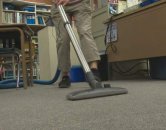'Gut punch': Canadians diagnosed with cancer in emergency sent home without treatment, study finds
More people in Canada who land in an emergency room with symptoms like belly pain or unexplained weight loss are being told “this may be cancer” — and sent home without knowing how long they’ll be waiting to get the follow-up care they need, a new study suggests.
The study of Ontario emergency doctors’ experiences managing people with suspected cancer paints a grim picture of how emergency staff are left “holding the bag” for what many described as a health system in crisis, and the “gut punch” patients feel when told “I don’t know when you’re going to be seen.”
Researchers have warned that, with one in five Canadians without a regular doctor, and wait times for tests for suspected cancer stretching months, getting a diagnosis of cancer in emergency is becoming “routine” in Canada.
Once diagnosed, people with a newly suspected cancer often leave emergency not knowing when they’re going get further work-ups like scans or biopsies or start treatment, according to the new study. Many emergency physicians feared that without a doctor to quarterback their care patients are being “lost to follow-up” — medical jargon for things not going as planned: A faxed referral letter gets lost in the “ether,” the patient never gets contacted by the clinic or the clinic has the wrong contact information.
Research has shown that people diagnosed with cancer through the emergency system have worse outcomes, the authors wrote, “with higher stages of diagnosis and increased mortality.”
But most emergency departments lack processes to ensure appropriate follow-up has occurred for discharged patients, they wrote.
“There is a huge portion of the population that are unattached, and they don’t have any primary care follow-up, so I can’t even say, ‘If you don’t hear (about a referral) at least talk to your family physician about this,’” one doctor said.
Emergency physicians described “ongoing inefficiencies” that are driving people with suspected cancer to emergency in the first place, including the millions lacking a family doctor — or who can’t get timely access to the one they do have — and months-long wait times to see specialists, receive a CT scan or undergo biopsy for an already suspected cancer.
“They just can’t get in, so the only other resource available to them is the emergency department,” said Dr. Keerat Grewal, an emergency doctor at Mount Sinai Hospital in Toronto and the study’s lead author.
Doctors described confusing, frustrating, “fragmented and inconsistent” pathways to get people from point A to point B, “with frequent specialist refusals of referrals,” and “unclear ownership and accountability for the patient.”
Emergency doctors can’t refer people directly to an oncologist without a tissue biopsy, which means another specialist to do the biopsy and follow up on results.
“The emergency department is one silo, and then oncology is another silo, and you can’t really move between them unless you have a tissue diagnosis,” one doctor said.
“It’s kind of a little bit shocking to me that given how many people cancer affects and how devastating a diagnosis it can be to receive, that we haven’t figured this out better.”
“The emergency department has become a catch-all, or, some people think, the garbage can of our health-care system, and everything that no one else can find out what to do with, they send them to us, and we are left holding the bag to try to figure out how we can care for these poor people that don’t have access to what they deserve,” another doctor said.
Family doctors face some of the same hurdles: A patient has symptoms suspicious for cancer, and “now you’ve got to get him to a specialist who can do a biopsy and then they can get to an oncologist,” Grewal said.
“But the emergency department isn’t set up for that.”
Earlier research by the same team found about a third of people with cancer in Ontario were seen in emergency in the 90 days before their diagnosis, likely for reasons related to cancer. They’re more likely to die over seven years than people whose cancers are discovered through other routes, like screening.
But emergency doctors often have no one clear person to refer to “who’s going to take ownership of these (follow-up) investigations,” as one physician described it.
“Like, if the patient misses their biopsy date or if there’s some sort of problem…. I am not set up to track that or take responsibility for that. But when people don’t have a family doctor who can do that, there’s really no clear place to send them, and it’s a real problem and it’s upsetting.”
A busy, noisy, chaotic emergency room is also far from the ideal environment to deliver or receive a cancer diagnosis.
“They aren’t expecting to get a cancer diagnosis that day,” one doctor said. “So, they don’t come prepared with people that would be there to support them through that conversation.
“We don’t often have enough information to know further what that means, in terms of prognosis, in terms of the type of treatments that they’re going to get,” she added. “Then, to also add on the burden and say, ‘I also don’t know when you’re going to be seen,’ is just a gut punch for them.”
Some arrive with symptoms of something worrisome, like severe abdominal pain, and a scan shows a mass suspicious for cancer, Grewal said.
But other cancers are discovered by pure chance: Someone comes in with shortness of breath they’ve chalked up to a flu bug, and a chest X-ray reveals a nodule in the lung.
“What people remember from their visit is, they brought me to this spot, or they, you know, alternatively, they told me in the hallway in front of everybody. And that’s, like, awful,” one doctor said.
With 30, 40, or 50 other patients waiting to be seen, there’s no time “to sit down and have this conversation for over an hour or so,” Grewal said.
“They leave with a lot of uncertainties. Often, we can’t say, ‘This is when you’re going to be seen. This is what your treatment is. This is what your prognosis is.’”
Lung cancer is one cancer with a good “diagnostic pathway,” Grewal said. In Ontario, special referral clinics provide rapid access to specialists and diagnostic procedures for people with suspected lung cancer. But they aren’t available everywhere.
Solutions include systems to ensure timely, standardized access to cancer workup from the emergency department and making sure people get where they’re intended to go, Grewal said.
The study, published in BMJ Open , involved interviews with 20 emergency doctors from Ontario’s six health regions.
The results may not represent doctors’ experiences outside of Ontario, the authors noted, however Grewal reported last year that receiving a cancer diagnosis in emergency has become “routine” in Canada.
“We’re all seeing this,” she said.
National Post
Our website is the place for the latest breaking news, exclusive scoops, longreads and provocative commentary. Please bookmark nationalpost.com and sign up for our newsletters here.



Comments
Be the first to comment